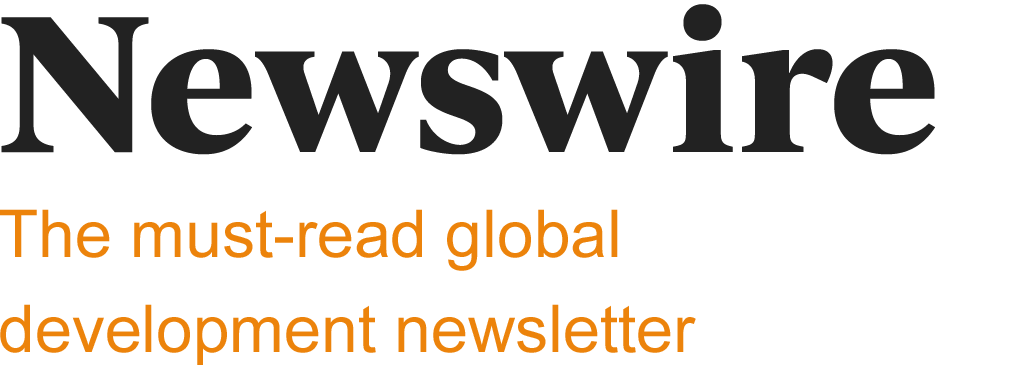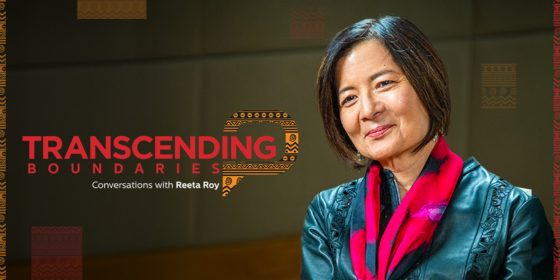|
Will Germany become the world’s leader in aid?
|
|
|
|
A federal judge ruled that Elon Musk and his budget-slashing Department of Government Efficiency might have stepped over the line by shutting down USAID, bypassing the U.S. Congress in the process. But the ruling’s real-world impact is debatable. Also in today’s edition: What will happen with Germany’s aid budget, now that it has a chance to pass the U.S. as the top global donor? 
|
|
Constitutional hiccup
A federal judge ruled that Elon Musk and his DOGE team’s gutting of USAID was probably unlawful. Judge Theodore Chuang indicated their actions “likely violated the United States Constitution in multiple ways” and sidestepped Congress. The lawsuit was initiated by anonymous USAID employees and contractors.
But the ruling isn’t an outright victory for those employees and contractors. It’s more like a partial reprieve. Notably, it doesn’t reinstate any programs or laid-off employees, saying the terminations would have been allowed if they had been done under the proper authorities, meaning that other Trump officials will likely be able to just reinstate DOGE’s policies. The court did mandate that Musk and DOGE swiftly restore access to vital electronic systems while protecting employees’ personal information, Devex Senior Reporter Adva Saldinger writes. The ruling also asserts that while the president can address issues of waste and fraud, Congress “alone” possesses the authority to eliminate agencies it created, making Musk and DOGE’s dismantling of USAID a likely violation of the Constitution’s separation of powers doctrine. Read: Judge finds DOGE’s shutdown of USAID ‘likely’ unconstitutional |
|
Second guessing
The world’s second-biggest aid donor, Germany, could take the lead after some hefty cuts in the United States. But post-election vibes suggest that Germany might tighten its purse strings too, with whispers of cuts and a shift toward “national interest.”
Last year, Germany was quite the generous giver, with nearly $38 billion in aid. But the winds are changing, and over €3 billion might get slashed from future budgets. The recent shift to the right in elections might bring a mix of the Christian Democratic Union and the Social Democrats to the table, but with CDU calling the shots. They’re eyeing areas such as migration management and international trade for their aid focus, Devex contributor Jessica Abrahams writes. Friedrich Merz, likely the chancellor, isn’t playing around. He’s hinting at cutting off aid to countries that don’t cooperate on migration and wants to ensure every aid penny serves German interests. Furthermore, the far-right Alternative for Germany party, now a big player in Parliament, is shaking things up, pushing to slash funds on what they label as “woke” initiatives. Despite not being in the government, its ideas are making waves, influencing policies such as migration. If Germany does become the world’s top aid donor, it’ll be the first time it’s held the top spot since 1960. Keep your eyes on a couple of key players, the BMZ and the AA, which together disbursed nearly 58% of the country’s total aid in 2022. The BMZ oversees the lion’s share, including two major implementing bodies: the GIZ and KfW. Despite some cutbacks, BMZ’s 2024 budget still clocked in at a chunky €11.2 billion, with a strong focus on bilateral cooperation and significant contributions to multilateral efforts such as the World Bank and United Nations. Devex analyst Miguel Antonio Tamonan takes a look at exactly where that money went, giving clues as to who might have a chance of winning some of it in the future. Read: Funding cuts and culture wars — what the German election means for aid Read more: Is Germany the next leader in ODA, and how will it spend its money? NOW they ask It seems U.S. lawmakers are playing a bit of catch-up, trying to wrap their heads around what's happening with USAID. House and Senate Democrats are pinging U.S. Secretary of State Marco Rubio and Peter Marocco for the lowdown on all the changes at USAID. And they’re not just asking for one side of the story. In a burst of investigative zest, Reps. Gerald Connolly and Suhas Subramanyam have also sent letters to NGOs and contractors, trying to get their take on the repercussions of dissolving USAID. They're worried about global health, unstable nations, and U.S. national security getting shaken up. Senate Democrats are also chasing Rubio for answers on the 90-day review of foreign assistance — for example, whether it’s still in process, how many projects were canceled, and whether any of those cancellations may still be reversed. They noted mixed messages on some of those points from the administration. Meanwhile, Democrats on the House Foreign Affairs committee want Marocco to testify on similar issues and have submitted questions for him to answer. Read: Democratic lawmakers push Rubio, Trump administration for USAID answers |
|
Escape the Neglect: Produced in Partnership
Neglected tropical diseases: treatments, impact, and progress
Over 1 billion people are impacted by neglected tropical diseases. Devex explores what WHO’s updated road map means and unpacks some promising programs in the pipeline. |
|
Owning it
Development is not just a job for many employees; it’s a long-term investment — one that’s supposed to last into retirement — but now that’s being jeopardized by the U.S. aid overhaul.
Several USAID contractors such as Chemonics and DAI encourage employees to take out employee stock ownership plans, or ESOPs, which gives workers ownership interest in the company. Rubio was even a big proponent of ESOPs as a senator, my colleague Jesse Chase-Lubitz writes. The benefit of an ESOP is that employees can purchase stock at a lower-than-market price. The downside is that it involves an investment in just one stock — their employer. If the employer goes bust, so might a sizable chunk of the employee’s retirement nest egg. That would be on top of losing a job and health insurance. Despite the significant loss, experts are generally supportive of ESOPs. “We need to keep in mind the problem is not with ESOP mechanism itself but the administration’s arbitrary and capricious actions are doing irreparable harm to employee owned organizations,” says a former employee of Chemonics and DAI. Read: If USAID contractors fold, staff retirement plans will disappear too ‘Homework’ for the sector Unlike in the U.S., where Trump’s aid cuts came down like a hammer, planned cuts in the U.K. are slated to be implemented between now and 2027 — which could provide enough time, some experts say, to cushion the blow. “The U.K.’s commitments to multilaterals and everywhere has been predicated on having a 0.5% budget,” said Ian Mitchell of the Center for Global Development at a recent Devex Pro event. “And so the longer you can have a 0.5% budget, the better prepared you are for 0.3%, and the less painful cuts you have to make.”  Mitchell also pointed out that the United Kingdom spends an unusually large portion of its aid budget housing refugees inside the country. Reducing spending on in-donor refugee costs — or simply taking the money from somewhere other than the aid budgets — could go a long way toward boosting overseas spending, Devex Business Editor David Ainsworth writes. Romilly Greenhill of Bond said the development community should also use this time to better sell itself. “If you talk to the public about, do you want to spend on aid, they generally say no,” Greenhill said. “But if you ask, do you want children to be vaccinated, women to have family planning, kids to go to school, conflict to be prevented, nature and climate to be protected? More of them say yes.” “That’s something for us to think about: Are we talking to the public in the right ways?” she added. “It’s a bit of homework for us in the sector to be honest.” Watch the full event recording: UK aid cuts — 6 things left to fight for |
|
Sponsored announcement
The African Women’s Inclusion Index: Tracking Africa’s progress on gender inclusion
Despite progress, women’s financial and economic inclusion in Africa remains slow. The African Women’s Inclusion Index, developed by the African Center for Economic Transformation, tracks how 42 African countries perform on legal rights, financial inclusion, leadership, and economic participation. At the current pace, full inclusion won’t be a reality until 2093. What can be done to accelerate change? |
|
In other news
Médecins Sans Frontières vehicles were attacked while evacuating staff from a Haiti hospital as the aid organization ceased operations due to rising gang violence in Port-au-Prince. [AP] Germany plans to nominate Foreign Minister Annalena Baerbock for U.N. General Assembly president, according to media reports. [Politico] The U.N. Human Rights Council session in Geneva saw top independent experts scrutinize the human rights records of Iran, Syria, and Venezuela on Tuesday. [UN News] 
|
|
Thank you for reading today’s Newswire, edited by Fiona Zublin, copy edited by Nicole Tablizo, and produced by Patricia Esguerra. Have a news tip? Email [email protected].
Forwarded by a friend?
Sign up here to receive the Newswire directly.
|
|
Devex thanks our partners for supporting our newsletters.
Our editorial content remains independent. Interested in partnering with us? Get in touch. |
|
Connect with us:
|







